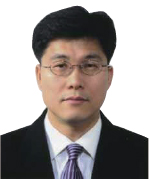
Professor Jae, UOS students normally consider students in Sports Informatics as athletes and only practice sports activities. What do students learn in ‘Sports Informatics’?
Our department was created in 2002 to make experts in sport for all. When we say ‘sports,’ it is rather more wide-ranged than people think. Of course, we teach students ‘exercise,’ but that is not all. Sports involve a various range of expertise. Just to name a few, sports involves science, medication, psychology, management, marketing and informatics (statistics). In UOS, our department teaches basic sports science as a beginning and broadens our major to physiology, anatomy, psychology and sociology. Juniors and seniors learn more specified sports subjects such as sports marketing and sports administration.
Then, what does ‘sports’ mean to you?
When people speak with me, they are always amazed by how sports entails immense fields of study. Well, it is difficult to put what sports is in one word. I think sports is like a ‘daily necessity.’ It brings people together just like an Olympic Game. It also gives people jobs just like me. However, most importantly, sports is deeply related to our health and stress. Sports relieve stress and it can be a daily getaway. A person needs to lead his or her life and enjoy it. What is important in one’s abundant life is good friends and positive thinking, and I strongly believe that sports does enrich that lifestyle.
What is your life-learned lesson and advice to UOS students?
I have only worked for five years in UOS, but I want to encourage all of our students to have ‘bravery’ and spread what they have learned through communication and experience. Bravery has always been a good stepping stone whenever I wanted to do something in my life time. I was a handball player as a student and majored in Physical Education. It came to me that I lacked scholastic knowledge since I focused on training for a long period as an athlete. Thus, I bravely stepped ahead to go to college. At that time, I knew nothing of English, so I went to an English academy for junior highs. It would have been a very ‘embarrassing’ thing, but I was able to bear it for a bigger goal. I finished the doctor’s degree and became a physical therapist at Samsung Hospital. I worked for almost 11 years there, but I wanted to put more effort on research. I had a decent job and I was doing well. However, I took the courage again and went to University of Illinois for Post Doctorate. Cardio Institution paid for my research after they recognized my eager passion to study. Now I am a professor and I am still seeking to develop myself. Like me sometimes, you need to be brave enough to let go of what you have and start again. “Believe in what you are brave about.”

